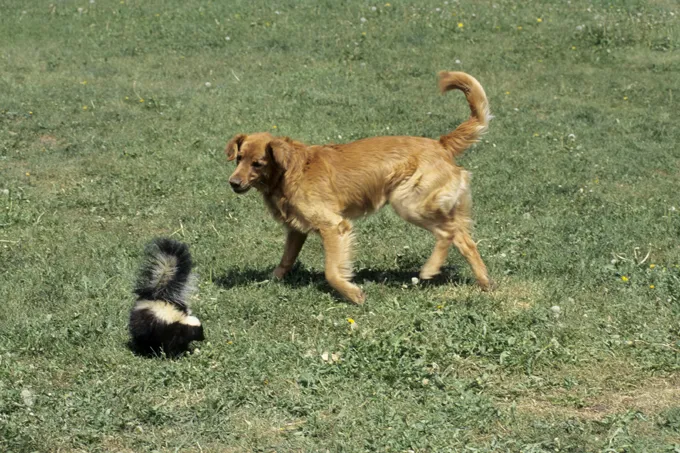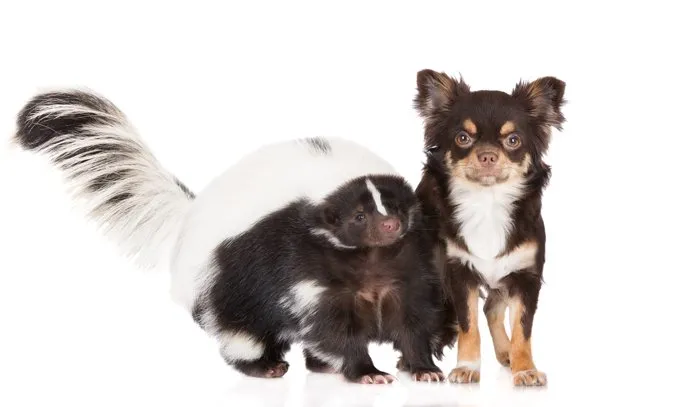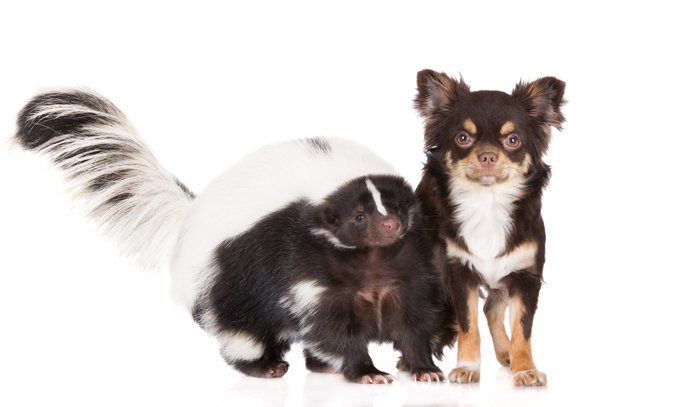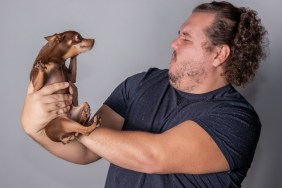
Sometimes David Greene of Maynard, Mass., wonders about the intelligence of his dog Harry. The 12-year-old longhaired Dachshund has been zapped by skunk spray three times in his life.
Produced by the skunk’s anal scent glands and used as a defense against predators, the foul-smelling fluid contains sulfurous chemicals known as thiols. Skunks can spray their liquid deterrent up to 15 feet, and many curious canines get a blast of it right in the face.
Skunked pets can be a chore to clean up. Folk remedies abound for removing skunk odor, but whether they work varies by individual.
A dog who gets hit at point-blank range, as Harry once did, will have a soaking-wet face and eyes that are watery and red from irritation. Act quickly and keep your dog outdoors so he doesn’t run into the house to rub his face all over your furniture in an attempt to ease the agony. Wrap him in a towel and bathe his eyes with a soothing eyewash solution available from your drugstore.
Then it’s bath time. Wear rubber or latex gloves to protect your own skin from odor, and shampoo your dog thoroughly — again, preferably outdoors. Rinse and repeat. Afterward, soak your dog in one of the many home remedies that are said to help eliminate the odor. They include tomato juice, apple cider and vinegar.
For instance, a homemade concoction of the following ingredients is effective:
- 1 quarter cup of baking soda
- 1 tsp. liquid soap
- 1 quart of hydrogen peroxide
Note: Do not make the above mixture in advance and store it, as it will explode if left over time.

Leah Yarnes, a dog owner in Tucson, Ariz., says the acid in tomato juice seems to cut through the oily base of the skunk spray. Her family’s pooch Ginger, a Greyhound-Labradormix, tangled with skunks on a regular basis.
“We would use at least four giant cans of tomato juice and completely douse her in it,” Yarnes says. “I would let it sit in her fur for a good while to really break down the smell, and then she’d get a long triple shampoo with something really yummy smelling.”
When Border Collie Roxie came out on the losing end of a skunk encounter, her owner, Charlotte Zappala of Lake Forest, Calif., bathed her first and then soaked her in apple cider vinegar. Even with repeated vinegar treatments, she says it took approximately six weeks for the skunk smell to completely dissipate. On the plus side, Roxie kept well away from the skunk when the animal made a return visit.
Greene swears by the baking soda solution. Although it can’t be mixed ahead of time and stored (it will explode), the ingredients are easy to find.
If possible, don’t let your pet get wet for a while after you’ve cleaned him up from a skunking. Moisture seems to reactivate and even worsen the odor.
No matter what you use, it’s virtually impossible to remove every trace of odor, says groomer Barbara Cole Miller of San Clemente, Calif. That’s because most dogs or cats are sprayed in the face, and it can be difficult to clean that area thoroughly without getting shampoo or other solutions in the eyes. And she cautions people who want to go the tomato juice route to envision what would happen when a dog shakes because there’s something wet on his coat. Sometimes the best solution is the easiest one: hire someone else to do the dirty work.
To avoid a skunking, remember the fashionably striped critters are crepuscular, meaning they are most active at dawn and dusk. If skunks share your neighborhood, deter them by putting away trash and pet food so it’s inaccessible and taking your dog outdoors on a leash when skunks are likely to be around.
Save









